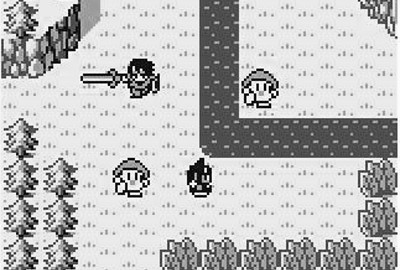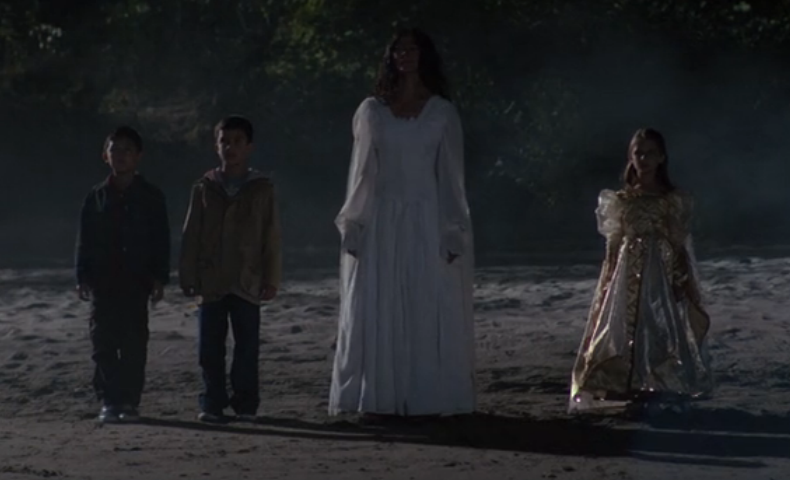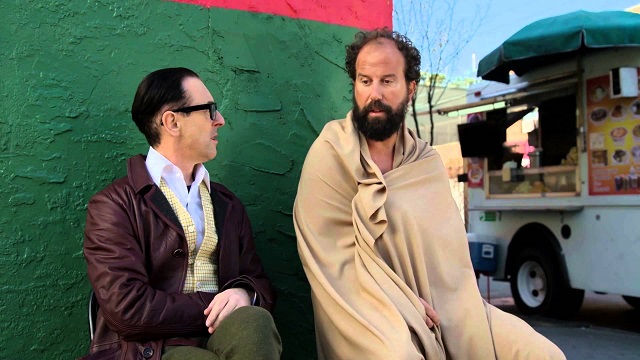Much like the role-playing genre, life is a grind. Responsibility to others and the duties required by circumstance make up any honorable existence where you can’t always get what you want. It’s hard, no way around it, and it doesn’t let up until the end of the game. It’s no wonder then that many of the genre’s stories bombard the player with drama amidst a somber world’s nearing ruin. The clock is ticking on us all, but while there’s no escape from the inevitable misfortune, there is also no choice but to soldier on. Surprisingly, one of the best examples of this philosophy came in the form of a now rare Gameboy game, Square’s Final Fantasy Adventure.
Final Fantasy Adventure was not your typical example at the time of a series that was just beginning its eventual skyrocket in popularity with the release of Final Fantasy IV (or II). It’s real-time instead of turn-based, a singular protagonist instead of a party system (though some NPCs do sometimes temporarily join up), and enemies appear on screen, not through those often annoying random encounters. What it does keep is Square’s sense of the tragic as a motivating force for storytelling, and in this it excels. The Hero (named by the player, providing instant connection and eliminating the need for heavy backstory) is a classic cosmic punching bag; he starts out in a bad way, endures loss after loss, only to be told that every sacrifice forced upon him is necessary for the good of all mankind. Not him, mind you, but everyone else. No, his role is that of reluctant martyr, someone for whom friendship is impossible because everyone he likes dies a horrible death, someone for whom happiness is never meant to be, because this stupid thing called “fate” says so.

Tragedy in myth or literature is often the result of faulty character, but instead of a cause for self-reflection it winds up as a way for the audience to nod their collective heads wisely while clucking their knowing tongues, mourning the unnecessary destructive acts inflicted on the unsuspecting fools at the heart of the story, all the while maintaining their own real-life superiority. After all, we aren’t as greedy, as power-hungry, or as easily manipulated as those poor saps. Tales like that of Macbeth or Othello, while certainly powerful and tragic, are kept at a slightly greater distance due to our belief in ourselves and the clearly solid understanding we have of the human nature. No, we can’t be tricked; we’re too smart for that. But bad things do happen, and if there’s one thing everyone can sympathize with, it’s that sometimes the universe is just out to get us, plain and simple. The Final Fantasy series is no stranger to themes of this kind, its plots often rife with suffering and pain caused by an uncaring fate and the uncontrollable malicious acts of those inhabiting the hateful side of the world, personifications of natural disasters, and Final Fantasy Adventure is certainly no exception. It’s this way of dealing out punishment that allows for an emotional connectivity with the audience by giving us something we can intrinsically relate to: the drawing of the short straw.
The world of Final Fantasy Adventure seems like a brutal place for just about everyone. As usual it’s good to be the king, but regular folk have no shortage of problems. If you’re not being attacked by any number of beasts inhabiting the forest, frozen in place by a sorceress monster, mocked by ageist kids because you can’t swing a sword like you used to, or turned into a parrot because of your wonderful singing voice, your town is probably under attack by the evil Glaive Empire who have no problem razing everything you care about to the ground. So, you know, have a nice life. Still, in keeping with the general mood, complaints are few. It’s hard not to admire the fortitude of these people.

Just like in reality itself, however, it feels like no one has it worse than you, the hero, but in this case that’s actually true. The game starts off with a main character who has a sword, cool armor, and awesome hair; so far, so good. Of course, you quickly find out that you are enslaved to an evil emperor and forced to fight wild beasts to the death in gladiatorial-style combat. Your best friend Willy, after a life spent being forced to kill, is himself cut down right before the player’s eyes, uttering with his dying breath a wish for the pursuit of freedom. After that prison break you are flung off a cliff, meet a girl who gets kidnapped by a vampire innkeeper, are betrayed by the mysterious stranger who helps save the girl, lose her again, fall off an airship, and are robbed of the planet-saving MacGuffin by a former slave colleague who herself gets screwed by a tyrant. The odds would say your hero is due for a change of luck, but the universe of Final Fantasy Adventure is not kind to those who are fated to save it.
And so after teaming up with that thieving back-stabber, you both track down Medusa in order to cure the woman’s brother. The fight goes wrong, the woman is changed into a gorgon, she implores you to kill her before she can hurt anyone, collect her healing tears, and tell her brother she loved him. After another fall off a mountain, your mentor breaks his back, you make a new robot friend only to watch him die saving you, kill the bad guy but in the process also the source of world peace, and finally watch the girl you like (and maybe more) become a tree in order to restore order to the land, leaving you alone once again, bound to protect her until the day you eventually die, a life dedicated to the service of some greater good that only serves to remind you of your continuous heartbreak. Like a true knight, however, you take these burdens as they come. Some human moments of weakness are only natural, but the true hero knows the difficult choice is most often the right one. Tough luck, but we all have to play the cards we’re dealt, and some are born more fortunate than others. Of course, none of those people are in this game, but nevertheless.

Hopefully gamers won’t have to wait forever for Square Enix to resurrect this classic, preferably in its original form. The world can be a bit of a maze, the puzzles aren’t as clever as a Zelda‘s, and the dialogue may seem simple compared with today’s standards, but the game still hits as satisfyingly home as ever. Final Fantasy Adventure will always be remembered as the game that started the Mana series, a blend of traditional RPG elements and real-time action, with towns to explore, dungeons to conquer, and a variety of useful weapons, but it’s overriding sense of the melancholy and tragic aspects of honor will always strike a harsh chord with those who enjoy picking up a sword to save a world that they themselves will never be allowed to enjoy.





